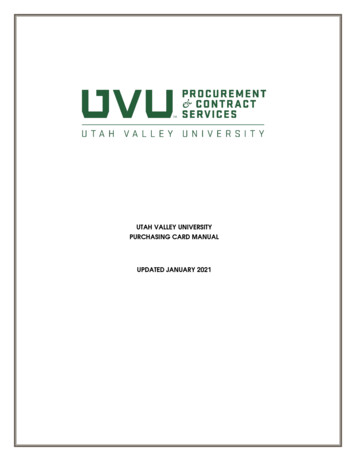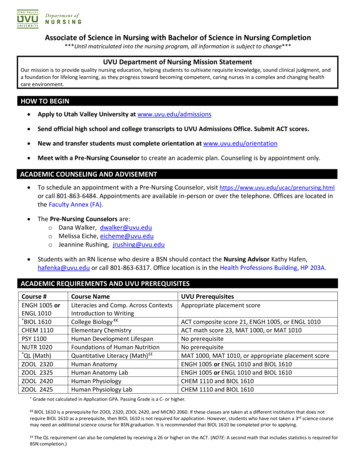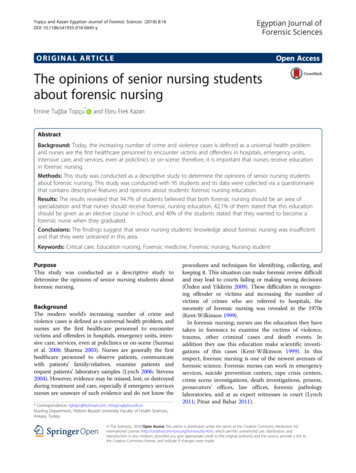
Transcription
SENIOR STUDENT GUIDE2020 - 2021UPWARD BOUND
2TABLE OF CONTENTSSenior Year To Do Listpg. 3Senior Year Calendarpg. 4College Admissions Checklistpg. 5Choosing a Collegepg. 6Local College Informationpg. 9Frequently Asked Questionspg. 12Federal Financial Aid Programspg. 14Scholarship Informationpg. 16Financial Aid & Scholarship Resourcespg. 17Strategies for Succeeding in Collegepg. 18Letters of Recommendationpg. 21Personal Portfolio Contentspg. 22Example of Introductory Pagepg. 23Worksheet for Introductory Pagepg. 24Example of Educational Resumepg. 25Example of Job Resumepg. 26Finishing the Personal Portfoliopg. 27FAFSA Checklistpg. 28
3SENIOR YEAR TO DO LISTFall Create a master calendar of deadlines. Include college applications, test registrationsand test dates, scholarship applications, housing and financial aid deadlines. Make sure you are on track for graduation. Meet with your school counselor to reviewyour credits and check that your transcript is up to date (especially if you are applying forthe Regents’ Scholarship). Consider taking college classes if your school offers them. Look for scholarships. Use sources such as your high school’s counseling centerwebsite, fastweb.com, internationalscholarships.com andbigfuture.collegeboard.org. Take the ACT Test (or retake it if you aren’t satisfied with your score). Seeactstudent.org for a list of test dates and registration deadlines, test preparation andonline registration. You are entitled to 2 ACT fee waivers as a UB participant! Attend college fairs and financial aid workshops. Most high schools will host a collegeday for seniors where you can visit with representatives and pick up information. Watchfor information on college representatives visiting your school. Make college visits on your own. Ask for letters of recommendation from teachers, employers and coaches. Write essays for college applications and scholarships. Make sure to ask a teacher oryour UB Advisor to proofread your essays. Prepare your senior resume and create an online resume using a Resume Builder. Create a professional email address if you don’t have one. Apply to colleges of your choice.Winter Keep looking for scholarships. Most college scholarships are due by February 1.Check with your high school counselor or scholarship advisor often. Keep working hard in school. Colleges do look at senior year transcripts! Ask your parents to file their taxes early this year so that you can begin your FreeApplication for Federal Student Aid (FAFSA). Gather tax information. Apply for Federal Student Aid at fafsa.gov. Apply for college housing after you have been accepted to the school of your choice. If you plan to attend UVU, apply for the Upward Bound scholarship.Spring Review financial aid packages offered by colleges. Make sure you have submitted allnecessary paperwork. Decide on a college and notify the admissions office by May 1st of your decision.Notify schools that you will not attend of your decision. Accept financial aid and/or scholarship offers from the college of your choice. Make sure you stay on top of information from your college. Many schools will set up acollege email address for you and communicate only through that address. Keep looking for scholarships. Many local scholarships become available in the spring,so do not miss out on these. Even a small award can help you pay for books or housing. Look into graduating with honors. See your high school counselor or UB advisor forinformation. Create a college budget to determine your needs for loans. Look for a summer job and start saving for college!
4SENIOR YEAR NOVEMBERAPRILDECEMBERMAY
5COLLEGE ADMISSIONS CHECKLISTü Make sure you are on track for graduation and that your transcript is in order beforerequesting one for a college application.ü Use the “Choosing a College” exercise in this booklet to explore what type of college is bestsuited to your personality and needs. The most important factor in choosing a college isfinding a good fit!ü Choose which college(s) you will apply to and check the priority application deadlines.Some can be as early as December 1st! Remember that you have to pay an application feefor each school you apply to, and you do not get it back if you decide not to go there. Somecolleges will waive the application fee if you make a campus visit or if their representativevisits your school. It never hurts to ask!ü Follow the directions on the college website to apply online. Make sure you follow all thesteps and submit your transcript and application fee.ü Watch for email confirmation that the college(s) has received your application and that youhave been accepted.ü If you did not have your ACT scores sent to the college(s) you are applying to, you will needto request that they be sent through actstudent.org. There is a fee to have them sent.ü If you need to take or retake the ACT, register online at actstudent.org. The latest you cantake the test is in December if you wish to have your scores considered for admissions andscholarships. ACT test dates for the 2020 – 21 year are below.Test DateOctober 10, 2020October 17, 2020October 25, 2020December 12, 2020February 6, 2021April 17, 2021June 12, 2021June 17, 2021Registration DeadlineSeptember 17, 2020September 17, 2020September 17, 2020November 6, 2020January 8, 2020March 12, 2021May 7, 2021June 18, 2021ü Once you have been accepted, you can apply for scholarships. Some collegesautomatically consider you for academic merit scholarships when you apply for admissions,but some will have a separate application. See the Scholarship Information pages in thisbooklet for more on applying for scholarships!ü Apply for housing if you plan to live on campus.ü Sign up for orientation and/or a meeting with an academic advisor before registering forclasses. Most colleges will not allow you to register for classes until you have met with anacademic advisor.
6CHOOSING A COLLEGEIf you are like many college-bound students, you probably made the decision to continue your educationearly, even before you started high school. Looking back, you may find your reasons for making thatdecision are no longer clear to you, or the reasons may have changed, just as you have changed in thepast few years.Whether you have known you were going to college, or whether you are considering it now for the firsttime, take this opportunity to think about your reasons. If you can state your objectives clearly at thestart, your college search will be much easier.Make a list of your reasons for going to college, putting your most important reason at the top of your list.1)2)3)4)5)Discuss your reasons for going to college with your parents, counselors, friends and anyone else whocan help you to focus on your long-term goals. Don't worry if your reasons are not the same as thoseof your friends or advisors: you are an individual and your reasons must make sense to you.Ask yourself if the best way to achieve your objectives is by going to college. If you think it is, then youare off to a good start.What are you like? Knowing yourself-- your abilities, interests, attitudes and personality-- plays animportant role in the college decision process. What you know about yourself will help you to define whatyou are looking for in a college. Try to get a clear picture of your strengths and weaknesses, your likesand dislikes.It is difficult to decide what's important to you in a college unless you have some guidelines. Thefollowing is a list of characteristics, which make one college different from another. Some of thesefactors will be important to you-- others may not be as important. This list is designed to help youdevelop a better definition of the kind of college you would like to attend.Indicate in the first column which of these factors would be important if you were able to "design" yourown ideal college. Then fill in the names of three colleges you are considering. Check the characteristicsthat fit that school. Compare your "ideal" school with each of the three and count the number ofmatching factors. If the school which is the closest match doesn't really seem like your favorite school-perhaps there are some factors, besides these, that you haven't identified, but that really are important toyou.
7Ideal4-year College4-year University with Graduate School2-year Junior College2-year Community CollegeVocational/Technical CollegeBusiness CollegeLarge size schoolMedium size schoolSmall size schoolSmall classesLarge classesPersonal attentionPrivacy/AnonymityOpportunity for athletic participationOpportunity for spectator sportsGood intramural sports programModern facilitiesOlder, "traditional" facilitiesClose to home/familyAway from home/familyGo where my friends goGo where someone in my family wentChance to "break away" from high school crowdBe with students like myselfBe with students different from me/my friendsGood academic reputationSummer school availableInternational reputationStudy abroad programsGood libraryResearch facilitiesStaff/faculty with strong academic credentialsStaff/faculty who are friendly and helpful"Classy" imageGood career counselingTutorial servicesGood job placement rateActive student governmentLots of student activities/clubsParticular student activities/clubs#1#2#3
8IdealTuition cost per academic yearCost per academic year: 1500 - 3000 3000 - 5000 5000 - 8000 8000 - 12000 12000 & upAvailability of financial aidAvailability of scholarshipsAvailability of on/off campus workActive social life on campusActive social life in communityLocation in large cityLocation in medium-size/small cityRural locationWarm climateCool climateRecreational opportunitiesAdequate on-campus housingAdequate off-campus housingReligious atmosphereEasy to be admitted (open-door policy)Hard to be admitted (selective enrollment)Remedial coursework availablePersonal counseling availableHonors program availableGood food in cafeteriaPrimarily residential campusPrimarily commuter campusState owned schoolPrivate collegeOther:TOTAL#1#2#3
LOCAL COLLEGE AND UNIVERSITYINFORMATION9Prices are approximate and subject to change. See college websites for exact information.Brigham Young Universitybyu.eduProvo, Utah 84602Admissions:(801) 422-2507Financial Aid:(801) 422-410495 N 300 WSalt Lake City, Utah 84101Approximate Enrollment32,000Tests RequiredACT or SATPriority Application Deadline FreshmenAug. 3Application DeadlineFeb. 1Application Fee 35Scholarship DeadlineFeb. 1Room and Board 3904 per semesterLDS Tuition/Fees 2895 per semesterNon-LDS Tuition/Fees 5970 per semesterBrigham Young University-Idahobyui.edu525 S Center StRexburg, Idaho 83460-4104Admissions: (208) 496-1300Financial Aid: (208) 496-1600Approximate EnrollmentTests RequiredPriority Application DeadlineApplication FeeScholarship DeadlineRoom and BoardLDS Tuition/FeesNon-LDS Tuition/Fees24,000ACT or SATDec. 1 35March 1 4081 per semester 2150 per semester 4300 per semesterDixie State Universitydixie.eduAdmissions:Financial Aid:(801) 524-8145(801) 524-8111Approximate Enrollment2,200Tests Required(for scholarships only) ACTApplication DeadlineTen days prior to semesterApplication Fee 35Scholarship DeadlineAug. 15Room and BoardVaries (no on-campus housing)LDS Tuition/Fees 1775 per semesterNon-LDS Tuition/Fees 3550 per semesterSalt Lake Community Collegeslcc.edu4600 South Redwood RoadSalt Lake City, Utah 84123Admissions:(801) 957-4073Financial Aid:(801) 957-4410Approximate Enrollment (13 campuses)30,248Tests RequiredACT or SATApplication DeadlineMarch 1Application Fee 40Scholarship DeadlineMarch 1Room and BoardVaries (no on campus housing)Tuition/Fees 2000 per semesterStudent Support ServicesGregory Roberts, Director(801) 957-4334gregory.roberts@slcc.eduSnow Collegesnow.edu225 South 700 EastSt. George, Utah 84770Admissions:(435) 652-7777Financial Aid:(435) 652-7575Approximate EnrollmentTests RequiredApplication DeadlineApplication FeeScholarship DeadlineRoom and BoardIn-State Tuition/FeesStudent Support ServicesJonathan Morrell, Director(435) 652-7656morrell@dixie.eduEnsign CollegeEnsign,edu150 College AvenueEphraim, Utah 84627Admissions:(435) 283-7144Financial Aid:(435) 283-713110,000ACT or SATAug. 15 35March 1 3164 per semester 2540 per semesterApproximate EnrollmentTests RequiredApplication DeadlineApplication FeeScholarship DeadlineRoom and BoardIn-State Tuition/FeesStudent Support ServicesMike Anderson(435) 283-7393mike.anderson@snow.edu5,000ACT or SATOpen 30March 1 2100 per semester 1918 per semester
10Southern Utah Universitysuu.edu351 West University BlvdCedar City, Utah 84720Admissions:(435) 586-7740Financial Aid:(435) 586-7735Approximate EnrollmentTests RequiredApplication DeadlineApplication FeeScholarship DeadlineRoom and BoardIn-State Tuition/FeesStudent Support ServicesChip Sharpe(435) 586-7771edwinsharpe@suu.edu10,000ACT or SATFeb. 1 50March 1 3625 per semester 3385 per semesterApproximate EnrollmentTests RequiredApplication DeadlineApplication FeeScholarship DeadlineRoom and BoardIn-State Tuition/FeesStudent Support ServicesAnthonie Nichols(435) 797-0595Anthonie.nichols@usu.edu28,000ACT or SATMarch 1 50February 1 3760 per semester 3712 per semester451 East 400 NorthPrice, Utah 84501Admissions:(435) 613-5226Financial Aid:(435) 613-5323201 Presidents CircleSalt Lake City, Utah 84112Admissions:(801) 581-8761Financial Aid:(801) 581-621125,000ACT or SATApril 1 55February 1 5131 per semester 4300 per semesterApproximate EnrollmentTests RequiredApplication DeadlineApplication FeeScholarship DeadlineRoom and BoardIn-State Tuition/Fees2,500ACT or SATOpen 50May 1 3858 per semester 2472 per semesterUtah Valley Universityuvu.eduWestminster CollegeWestminstercollege.edu1840 South 1300 EastSalt Lake City, UT 84105Admissions(801) 484-7651Financial Aid(801) 832-2500Approximate EnrollmentTests RequiredApplication DeadlineApplication FeeScholarship DeadlineRoom and BoardIn-State Tuition/FeesTaggart Student CenterLogan, Utah 84322Admissions:(435) 797-1079Financial Aid:(435) 797-0173Utah State University Easternusueastern.eduUniversity of Utahutah.eduApproximate EnrollmentTests RequiredPriority Application DeadlineApplication FeeScholarship DeadlineRoom and BoardIn-State Tuition/FeesStudent Support ServicesKyle Ethelbah(435) 581-7188kethelbah@sa.utah.eduUtah State Universityusu.edu2000ACT or SATDec 1 50March 15,550 per semester19,000 per semester800 West University ParkwayOrem, Utah 84058Admissions:(801) 863-8706Financial Aid:(801) 863-8442Approximate Enrollment40,000Tests RequiredACT or SATApplication DeadlineAugust 1Application Fee 35Scholarship DeadlineFebruary 1Room and BoardVaries (no on campus housing)In-State Tuition/Fees 2863 per semesterStudent Support ServicesKeith Jensen(801) 863-8426jensenke@uvu.edu
11Weber State Universityweber.edu3848 Harrison BlvdOgden, Utah 84408Admissions:(801) 626-6050Financial Aid:(801) 626-7569Approximate Enrollment28,000Tests RequiredACT or SAT(for scholarships & placement only)Application DeadlineOpenApplication Fee 30Scholarship DeadlineJan. 11Room and Board 5845 per semesterIn-State Tuition/Fees 2993 per semesterStudent Support ServicesEddie Hoyle. Director(801) 626-7349ehoyle@weber.edu
12FREQUENTLY ASKED QUESTIONSWhere do I get money for college?Parents and students will always be expected to contribute to the cost of a collegeeducation. Other sources of aid are scholarships, grants, loans, and college work-study.Scholarships: money given for education, based on merit, need and/or talent, no needfor repayment.Grants: money given to those who qualify based upon financial need, no need forrepayment.Loans: money loaned at a favorable rate, must be repaid.Work-Study: money paid to a qualified individual in exchange for work on campus.NOTE: Private scholarships make up less than 1% of available student aid. Most scholarshipmoney comes directly from individual colleges-- this is why communication between students andcollege representatives is so important. Parents and students will need to complete financial aidforms to be eligible for funds from sources other than scholarships.What forms must I complete to qualify for financial aid?The FAFSA, or Free Application for Federal Student Aid, is the main source for qualifying forfinancial aid. It is used to determine eligibility for federal Pell grants, as well as federallysubsidized loans, work-study and state and institutional aid. Many scholarships also requirethat you fill out the FAFSA, which must be filled out every year you attend college. Everystudent should fill out the FAFSA, even if you think your family will not qualify. It can befilled out online at fafsa.gov as early as October 1 of your senior year, and will be based ontax information from the previous year. Much of the financial aid is given out on a firstcome, first-serve basis, so it is to your advantage to get the FAFSA filed as soon aspossible. See Federal Financial Aid Programs section for more information.What is an FSA ID?The FSA ID is a username and password that you must use to log in to certain U.S.Department of Education (ED) websites. It replaces the FAFSA PIN previously used forelectronically signing the FAFSA. Your FSA ID identifies you as someone who has the rightto access your own personal information on ED websites such as the Free Application forFederal Student Aid at fafsa.gov. Each student and parent will need their own FSA ID tosign the FAFSA. Apply for a FSA ID before you complete your FAFSA. Seewww.studentaid.gov for more information and to apply for an FSA ID.Where do I find scholarships?Start with the college you want to attend. Find the financial aid page on their website andlook for scholarships you may qualify for (some schools publish a scholarship/admissionsindex, some don’t). Many colleges will consider you for academic scholarships when youapply for admissions, others may have a separate application. There may also be
13scholarships for those with special talents (music, sports, drama, etc.), leadershippotential, financial need, ethnic or cultural diversity and other characteristics.Your high school’s counseling office is the next best source for scholarship information. Ifthey have a website, get familiar with it. Check back often for new scholarships andopportunities. Let the counselor know what school you want to go to, what your interestsare, and that you are looking for scholarships. Personal relationships with your counselor,UB advisor, administrators and teachers can be a great benefit in finding scholarships.Online sources can be a great way to look for scholarships, but keep in mind that many ofthese are nationally advertised, and you will be competing with a huge pool of applicants.Check first with where you can build a scholarship profile and receive updates whenscholarships that fit your profile become available. Other good sources are fastweb.comand bigfuture.collegeboard.com. Never pay to apply for a scholarship. See section onScholarships for more information.If I want to apply for an institutional (from the college itself) scholarship, must I apply foradmission at that school?YES! In order to have your scholarship application accepted for consideration, you mustmeet the admission requirements for that school.How do I apply for Admission?See page entitled College Admissions Checklist.May I apply for more than one scholarship?YES! You should apply for as many scholarships as you can. If the college has restrictionson receiving more than one scholarship, they will let you know. The more scholarships youapply for, the better chance you have of receiving one. Make sure to save a copy of yourapplications, so that you can re-use pertinent materials.What if I plan to serve a religious mission before attending college?Most colleges in Utah will defer your admission and scholarships for religious orhumanitarian missions, illness or military service. It is imperative that
Salt Lake Community College slcc.edu 4600 South Redwood Road Salt Lake City, Utah 84123 Admissions: (801) 957-4073 Financial Aid: (801) 957-4410 Approximate Enrollment (13 campuses) 30,248 Tests Required AC











